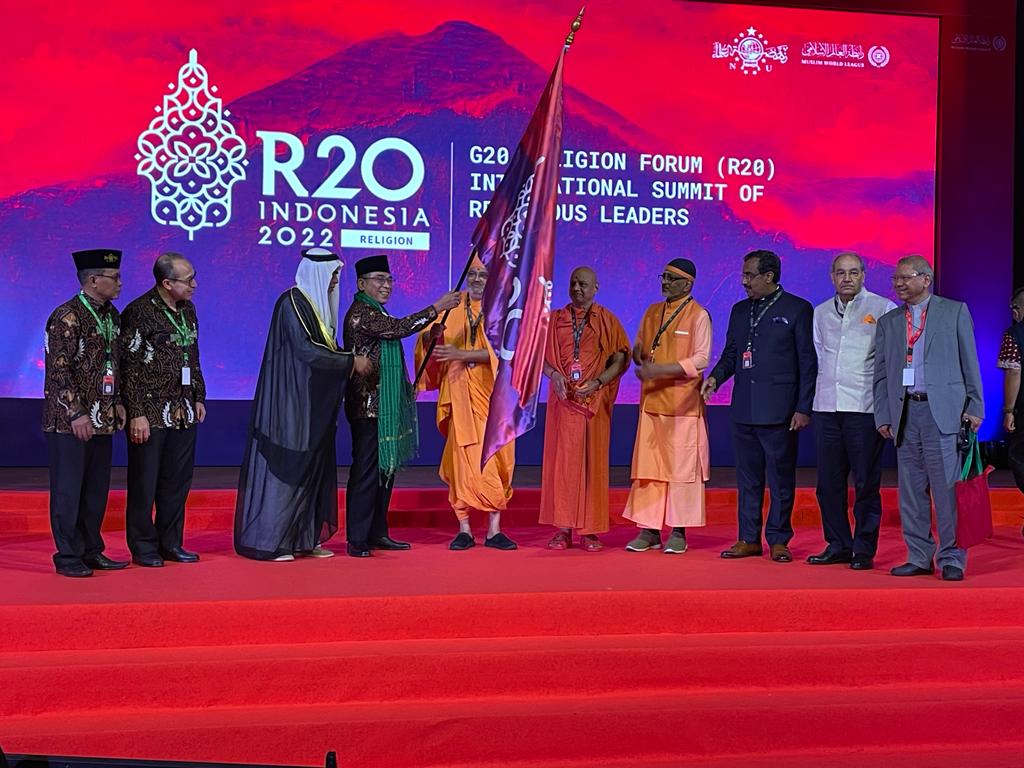
Amidst a global landscape often marked by divisions and conflict, Indonesia emerged in 2022 as a leader in reimagining the role of religion in fostering peace. During its presidency of the G20, Indonesia launched the Religion Twenty (R20) Forum, a groundbreaking initiative that brought together religious leaders from diverse traditions to address global challenges. Unlike conventional interfaith dialogue forums, R20 aimed to position religion not as a source of conflict but as a catalyst for solutions to the world's pressing problems.
The R20 Forum, held in Bali as part of Indonesia’s G20 presidency, was spearheaded by Nahdlatul Ulama (NU), the world’s largest Islamic organization. Its purpose was clear: to redefine the role of religion in the 21st century, emphasizing its potential to contribute to peacebuilding rather than exacerbate divisions. The forum’s theme, “Revealing and Nurturing Religion as a Source of Global Solutions,” set the tone for discussions that went beyond traditional interfaith engagement.
R20 stood apart from other forums by focusing on religious leaders who are deeply embedded in their communities rather than academics or activists. It addressed core religious issues often ignored in similar initiatives, fostering an open and honest exploration of the challenges and responsibilities faced by faith traditions.
For Indonesia, hosting R20 was not merely an act of diplomacy but a demonstration of its commitment to pluralism and tolerance. By leveraging its religious diversity, Indonesia showcased its ability to model interfaith harmony for the global community.
This dual narrative was evident in the forum’s focus on addressing historical injustices perpetuated in the name of religion. From the colonial exploitation of indigenous peoples to religiously motivated conflicts, participants acknowledged the pain caused by their faiths while also highlighting religion’s capacity for healing and unity.
Speakers such as Pope Francis and representatives of the Muslim World League called for religion to reclaim its place as a moral compass, guiding humanity toward peace and coexistence. This transformative vision of religion aligned with R20’s goal of promoting global harmony through mutual respect and understanding.
The forum also demonstrated Indonesia’s capacity for innovative diplomacy. By engaging figures such as Ram Madhav from India’s Rashtriya Swayamsevak Sangh (RSS) and leaders from Saudi Arabia’s Muslim World League, R20 bridged divides between groups with historically antagonistic relationships. Indonesia’s approach emphasized dialogue over division, even when it meant inviting controversial participants to the table.
At a time when many nations struggle to reconcile religious and secular identities, Indonesia’s leadership offered a model for how diverse societies can thrive through mutual respect and collaboration.
Despite its successes, R20 faced significant criticism. Some questioned its theme of “religion as a solution,” arguing that religion’s historical association with violence and exclusion undermined its credibility as a force for peace. Others criticized the inclusion of figures from groups perceived as intolerant, such as India’s RSS, which has faced accusations of promoting Hindu nationalism at the expense of minority rights.
The involvement of Saudi Arabia’s Muslim World League, a co-host of the forum, also raised eyebrows. Critics pointed to the kingdom’s Wahhabi tradition, often associated with religious intolerance, as contradictory to the forum’s message of inclusion. However, R20 organizers defended their decision, emphasizing the importance of engaging with all actors willing to work toward moderation and dialogue.
These criticisms highlight the complexity of interfaith engagement in a polarized world. While R20 succeeded in bringing diverse voices together, its ability to sustain meaningful dialogue and translate discussions into action remains an ongoing challenge.
R20’s success also depends on its capacity to influence public policy. By integrating the forum’s outcomes into national and international agendas, religious leaders can amplify their voices in addressing issues such as poverty, climate change, and social justice. The inclusion of non-religious actors in future forums may further enhance its reach, creating a broader coalition for change.
In a global era defined by polarization and conflict, R20 offers a beacon of hope. It challenges religious leaders to confront their traditions’ shortcomings while embracing their potential to inspire justice and compassion. For Indonesia and the world, the forum is a reminder that religion, at its best, can be a source of solutions rather than problems.
As R20 continues to grow, its legacy will depend on its ability to move beyond dialogue and toward tangible action. If successful, it may well redefine how religion is perceived and practiced in the 21st century, creating a world where faith unites rather than divides.
Note: This piece is an excerpt from the full article published in Religió: Jurnal Studi Agama-agama and can be accessed here.
This article explores how religiosity in Indonesia, while rooted in...
This article explains Aceh's efforts to balance high expectations with...
This article examines Nigeria’s northern insecurity crisis as more than...
This article explores Indonesia’s potential to develop a sustainable national...
This article discusses the implications of the removal of Imran...
This article explores how digital fandom surrounding West Java Governor...
This article explores how climate change is reshaping global security,...
This article analyzes the fragile foundations of President Prabowo Subianto’s...
This article examines how democracy can paradoxically bolster authority held...
This article examines the ECOWAS Court’s ruling against Nigeria’s Kano...
This article explores the fearless activism of Mahrang Baloch, a...
This article examines the controversial approval of a presidential state...
This article examines Sudan’s turbulent path toward democracy, where military...
Pope Francis’ visit to Indonesia marked a significant moment for...
This article examines the underrepresentation of women in Nepal's labor...
The 2024 regional elections in West Sumatra marked a significant...
The article explores Syria’s prospects for a democratic transition following...
By examining overlapping identities and marginalization, especially in the Global...
This article explores the role of Sufism in fostering interfaith...
This article highlights the Role of Shura in Decolonizing Decision-Making...
The article examines the recently brokered ceasefire between Israel and...
In a world often marred by division, Indonesia’s 2022 G20...
Leave A Comment